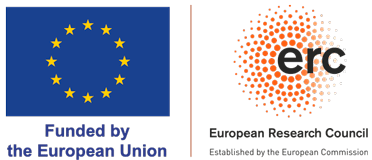
2023/08/04
Researcher Alberto Fernández Tejada obtains his third ERC Proof of Concept grant in a row
The winning project, known as ADJUPROBE, will exploit a lead adjuvant probe as a dual technological tool for the development of next-generation vaccines.
The European Research Council allocates funding to explore the commercial potential of research work.
The European Research Council (ERC) has awarded a new Proof of Concept (PoC) grant to Prof. Alberto Fernández Tejada, Ikerbasque Research Professor and Principal Investigator at the Chemical Immunology laboratory in CIC bioGUNE - member of the BRTA. This marks the third consecutive ERC-PoC grant awarded to Fernández Tejada in the last three years, an unprecedented milestone for an ERC Starting Grant holder.
Worth EUR 150,000, ERC PoC grants are specifically designed to support researchers who have already been ERC grantees and intend to explore the commercial potential of their research results. In the current call, the ERC-funded ADJUPROBE project seeks to establish proof-of-concept of an innovative adjuvant technological tool in terms of scale up, preclinical development and mechanistic validation, with a view to develop more rational molecular vaccines and to assess their potential for commercial exploitation.
Adjuvants are key ingredients added to vaccines that increased the immunogenicity of the antigen, helping potentiate the induced immune responses. They can serve as delivery vehicles and activate antigen-presenting cells, while also enabling dose-sparing. These features make adjuvants critical components for enhancing the efficacy of vaccines and for making them more cost-effective, which has important public health and socioeconomic implications.
By combining synthetic chemistry and molecular immunology with preclinical trials, ADJUPROBE aims to leverage a lead adjuvant tool developed in the previous ERC Starting Grant project (ADJUV-ANT VACCINES). The goal now is to exploit and advance this adjuvant asset as a dual technology to drive rational, forward-thinking vaccine innovation with potential for prospective clinical applications in the future.
Prof. Alberto Fernández Tejada holds a PhD in Chemistry and has become a successful Principal Investigator at CIC bioGUNE, leading an interdisciplinary research program in chemical immunology. Over his career, he has received very prestigious awards and grants, including a Fulbright scholarship (2009) and two consecutive Marie Curie postdoctoral fellowships (2010 and 2013). As an independent researcher, he has secured funding from a variety of significant national and European programs, including a Ramón y Cajal contract from the Spanish Ministry of Science and Innovation (2015), an Ikerbasque Research Fellowship (2016), an ERC Starting Grant (2016), an AECC LAB grant from the Spanish Association Against Cancer (2022) and three ERC Proof of Concept grants in a row including this one (2021, 2022, 2023).
Prof. Fernández Tejada's research focuses on the development of new adjuvants and optimized molecular vaccines while exploring key biochemical aspects related to their immunostimulant mechanisms. He possesses extensive research expertise at the frontier of chemistry and biology, having worked at renowned national and international institutions. These include the Memorial Sloan Kettering Cancer Center in New York, USA, the Biological Research Center CIB-CSIC in Madrid, Spain, and the University of Oxford in Oxford, UK. Since 2017, he has been a Group Leader and Principal Investigator of his own research group in Chemical Immunology as an Ikerbasque Research Professor at CIC bioGUNE in Bilbao. This new ERC PoC grant for ADJUPROBE represents the fourth ERC grant for Prof. Fernández-Tejada since starting his independent researcher position, a key milestone that emphasizes his commitment to bridge the gap between scientific research and commercialization while advancing the field of molecular vaccines.
About CIC bioGUNE
The Centre for Cooperative Research in Biosciences (CIC bioGUNE), located in the Bizkaia Technology Park, is a biomedical research organisation conducting cutting-edge research at the interface between structural, molecular and cell biology, with a particular focus on the study of the molecular bases of disease, for use in the development of new diagnostic methods and advanced therapies.
About Ikerbasque
Ikerbasque - Basque Foundation for Science - is the result of an initiative of the Department of Education of the Basque Government that aims to reinforce the commitment to scientific research by attracting, recovering, and consolidating excellent researchers from all over the world. Currently, it is a consolidated organization that has 290 researchers/s, who develop their work in all fields of knowledge.
About BRTA
The BRTA is an alliance made up of 4 collaborative research centres (CIC bioGUNE, CIC nanoGUNE, CIC biomaGUNE and CIC energiGUNE) and 12 technology centres (Azterlan, Azti, Ceit, Cidetec, Gaiker, Ideko, Ikerlan, Lortek, Neiker, Tecnalia, Tekniker and Vicometch), with the aim of developing advanced technological solutions for Basque companies.
With the support of the Basque Government, the SPRI Group and the Provincial Councils of the three regional provinces, the alliance seeks to promote collaboration among its centres, to strengthen the conditions to generate and transfer knowledge to companies, contributing to their competitiveness, and to spread Basque scientific and technological capacity outside of the Basque Country.
BRTA has a staff of 3,500 professionals, accounts for 22% of the Basque Country’s R&D investment, generates an annual turnover of over EUR 300 million and files 100 European and international patents per year.

See a large version of the first picture





